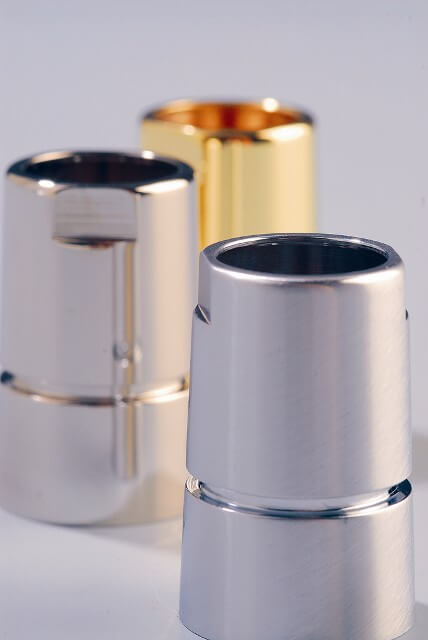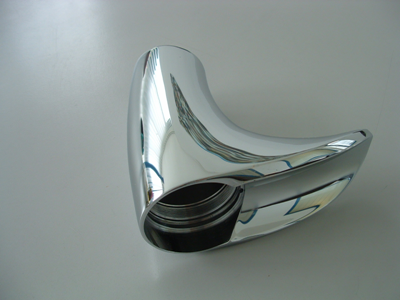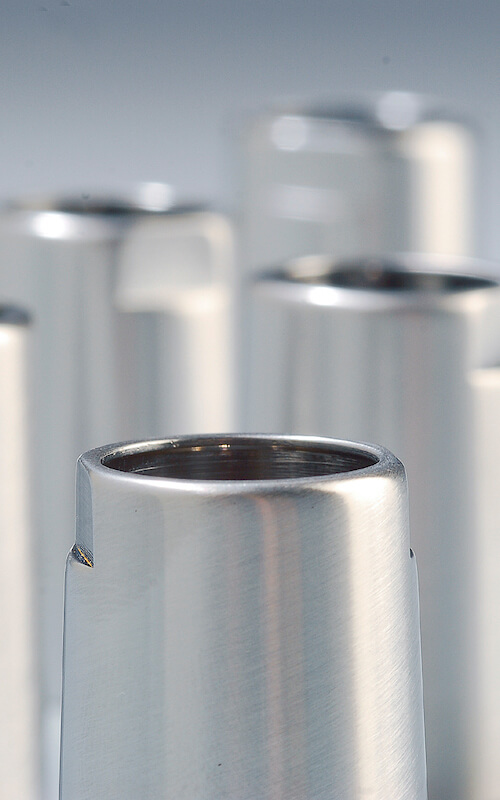Chrome plating
Chrome plating - The process
Chrome plating leads to a significant improvement in the appearance, corrosion resistance and wear resistance of the product. The electroplating process has proven itself for many years in a wide range of industries, e.g. in mechanical engineering, in the decoration and jewelry sector or in ship restoration. In addition, chrome serves as a base layer for hard PVD coatings made of TiN, ZrN, TiAlN and others, as it ensures a hard surface and tarnish protection for nickel.
Advantages of chrome plating
- Very hard layer, therefore extremely wear and abrasion resistant
- A chrome layer can be applied to highly polished parts to maintain a mirror-finish surface in the long term
- Insensitive to weathering due to protective chromium oxide layer
- Also ideal as an undercoat for PVD coating
- High tarnish resistance - does not discolor at high temperatures
- Due to the low layer thickness, the surface structure of the base material is retained. To create a high-gloss layer, it is necessary to deposit a nickel undercoat.
- Wide range of applications from decorative to functional

Why choose Techno Coat?
Everything from a single source
Speed
Many years of experience
High quality standards
Barriere- oder Zwischenschicht
für nachfolgende Oberflächenveredelungen (beispielsweise PVD-Beschichtungen)
Are you looking for a partner for chrome plating?
Then contact us now.
We look forward to being able to process your request individually.
Technical specifications
| Materials: | Copper, brass, steel, bronze, cast iron |
| Plant capacity: | 500 x 300 x 150 mm (oversize by arrangement) |
| System technology: | Frame |
| Execution: | glossy, matt |
| Layer thickness: | approx. 0.3 µm |

Warum bei Techno-Coat?

Alles aus einer Hand
Wir bieten Ihnen eine Vielzahl möglicher Kombinationsschichten aus einer Hand. So kann z.B. eine Nickel-Chrom-Kombination als Unterschicht für eine PVD-Schicht dienen.
Schnelligkeit
Aufgrund unserer Flexibilität und unserer großen Kapazitäten sind wir in der Lage Ihre Produkte innerhalb kürzester Zeit zu verchromen.
Langjährige Erfahrung
Über 25 Jahre Erfahrung fließen in die Veredelung Ihrer Produkte ein.
Hoher Qualitätsanspruch
Profitieren Sie von höchster Qualität beim Verchromen Ihrer Bauteile. Interne Prüfverfahren und unsere DIN ISO 9001 Zertifizierung unterstreichen unsere hohen Ansprüche.
How we chrome plate - the process
Pre-treatment
Depending on the delivery condition, pre-treatment may be necessary to remove unwanted contamination or residues from previous processes. For this purpose, the parts are processed in an ultrasonic cleaning system.
Decoction degreasing
A further cleaning step takes place in the boil-off degreasing process. This removes the last residues that may not have been removed during ultrasonic cleaning.
Cascade sink
The chemical residues of the degreasing/cleaning process are neutralized. This step is repeated during the process.
Pickling
The metal surface is freed from existing corrosion. Various additives ensure that the base material is largely unaffected.
Electrolytic degreasing
Electrolysis creates small bubbles on the surface. These cause fine cleaning by blasting off dirt particles.
Activation
This process step removes existing passive layers and activates the surface for the subsequent coating.
Nickel plating
To produce high-gloss coatings, a nickel underlayer is deposited.
Chrome plating
The chrome electrolyte contains chromium ions, which are converted into metallic chromium at a defined current flow on the component, allowing a chromium layer to grow. This is followed by a final rinse.
Drying
The chrome-plated product is dried with hot air in the circulating air dryer.
Frequently asked questions
Chrome offers the following advantages as a surface finish:
- Extremely thin layer thickness of approx. 0.5 μm, whereby the surface structure of the base layer is retained
- Very hard layer
- High wear resistance
- High abrasion resistance
- Chromium oxide layer protects against weathering
- Also ideal as a base for PVD coatings
- High tarnish resistance
- Wide range of applications
The following disadvantages must be taken into account when chrome plating:
- Not resistant to salt water or chloride
- The electrolyte has a comparatively poor scattering ability, which can lead to difficulties in layer build-up with more complex geometries.
Copper, brass, bronze, steel and cast iron are mainly suitable for chrome plating.
Our system capacity is 500 x 300 x 150 mm. We can also coat larger components by arrangement. Just ask us about this.
Special frames are used for chrome plating.
Request now
Send us your request simply and conveniently using the form.
You will receive our information on the coating process directly afterwards.
If you are not sure about certain details, please contact us directly by e-mail or telephone or leave the fields blank.
We look forward to receiving your inquiry!
Your contact person

- Reiko Röthig
- r.roethig@techno-coat.com
- +49 (0) 3583 / 77 21 - 34
